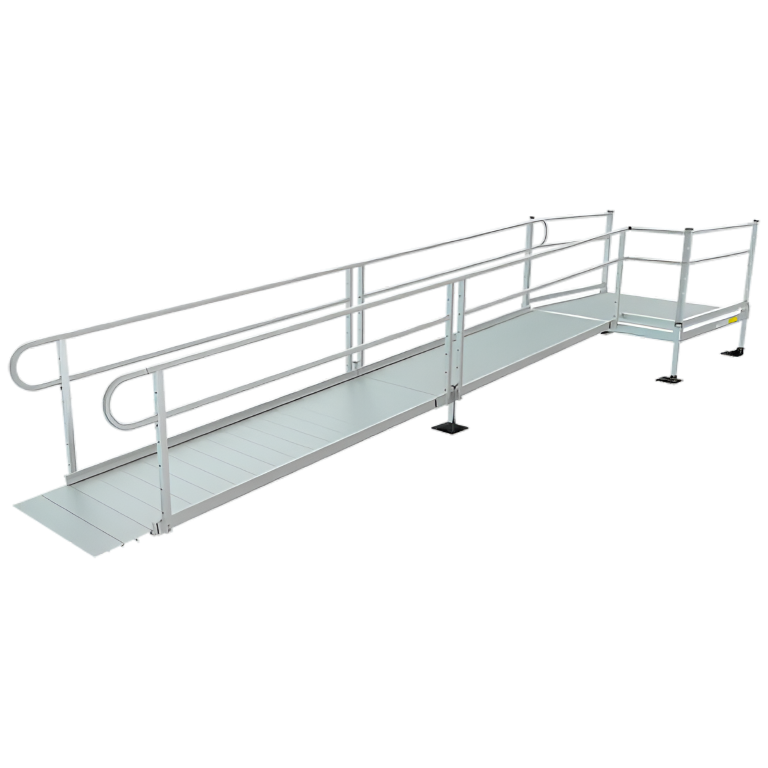Most businesses and public organizations sell or distribute products or services. But to be successful, there's much more involved than selling and distribution. Those responsible for a company's or organization's operations must comply with numerous regulations and acts, like The Americans with Disabilities Act (ADA), to achieve and maintain success. They must also analyze their operational processes and look for ways to improve efficiency in all departments. And whether you realize it or not, wheelchair ramps are key to both of these goals.
Why Do Businesses Need Wheelchair Ramps?
Wheelchair ramps make mobility easier in a lot of situations. Think about it. Disabled customers find it much easier to enter business locations that have wheelchair ramps. A ramp is also of immense benefit when wheeling products on a dolly in and out of the store.
Probably the most important reason, however, to make sure your business has wheelchair ramps is because hiring an attorney and going through litigation for any business-related lawsuit can undoubtedly become expensive and time-consuming. From financial and operational perspectives, a lawsuit can shatter a business's ability to keep its doors open. This is why it's crucial to understand how to achieve compliance with ADA regulations. One of the best places to start is by making sure your business's property has wheelchair access.
The ADA specifically states that all businesses and organizations must provide wheelchair access at all brick-and-mortar locations to ensure those with disabilities can access the building. If wheelchair access is not provided, the Act states this is cause for discrimination, which greatly increases the risk of facing lawsuits.
A 2016 Forbes article details how the owner of Chicago's LaSalle Flowers, Margot Sersen, knows all too well the cost of not complying with the ADA. Her shop was built in the 19th century, and since its front entrance is on the public sidewalk, there is not enough space to install a permanent wheelchair ramp.
All was well for Sersen until she received a letter from Mary Mizerk's lawyer, John Steele, with the letter asking for compensation for discrimination. The letter outlined Mizerk's claim in which she stated there was no way for her to maneuver her wheelchair into Sersen's store (which would require going up a five-inch stoop), thus meaning she felt discriminated against.
After a lot of back-and-forth, Mizerk did receive compensation. Sersen thought since her building was so old, she would be "grandfathered" in if any litigation was to arise. But she was wrong. The ADA states that any physical barriers, even the ones that were present before the ADA was adopted, can be used in litigation as a cause for discrimination. Sersen ended up paying Mizerk $2,500 and also purchased a removable aluminum ramp to ensure wheelchair access for any disabled person wanting to come into her store.
How to Choose the Right Wheelchair Ramp
To know how to choose the right wheelchair ramp, you first need to know that residential and commercial ramps are different. Residential ramps are, of course, usually installed at residential locations while commercial ones are installed at business locations. But even commercial ramps are available in several types.
Permanent Wheelchair Ramps
Permanent wheelchair ramps for commercial properties are anchored into the ground, with concrete anchors ensuring long-term stability. These ramps are usually added with the intention of making them a permanent addition to the building. Depending on the exact location of the ramp's installation, a contractor may have to make the ramp from scratch to accommodate any physical barriers the building may exhibit.
Semi-Permanent Wheelchair Ramps
Semi-permanent ramps aren't usually anchored to the ground with concrete anchors. They are typically installed with the intent to remove or adjust them as needed. Many semi-permanent ramps are a combination of portable ramp and permanent ramp parts. The aluminum modular ramp is the most common type of semi-permanent wheelchair ramp. This type of ramp can be installed in only a few hours and is quite easy to move to a new location when needed.
Portable Wheelchair Ramps
Portable ramps are ideal for those with rental properties who need to provide wheelchair access to a tenant. They are also perfect for those who need to travel with a wheelchair ramp on a regular basis. These ramps come in many sizes and are usually simple to break down and store. Portable ramps are also a wise investment because they serve as a temporary solution to business owners who don't currently offer wheelchair access.
Vehicle Wheelchair Ramps
All businesses and organizations will benefit from having at least one business vehicle with wheelchair access. Even if you don't regularly transport customers or products, you never know when you may need to, and having a vehicle with a wheelchair ramp during instances like these can prove of the utmost value. Vehicle wheelchair ramps are available in multiple designs, including single track ramps as well as two-track versions which are particularly of benefit if you are transporting someone with a scooter or motorized wheelchair.
Threshold Ramps
Often forgotten about, threshold ramps are essential to any commercial property because they make it easier for wheelchairs and dollies to go through doorways and up and down raised landings. Like most other commercial wheelchair ramps, the threshold ramps are available in many sizes and designs like the larger ones that connect directly to permanent or portable ramps. Smaller ones are typically ideal for entrances and raised landings where a small slope is needed.
Final Thoughts
We hope that you have a better idea now of why you need commercial wheelchair ramps and how to pick the best one for your business. You can always contact a wheelchair ramp specialist to help with all of your commercial ramp needs.

